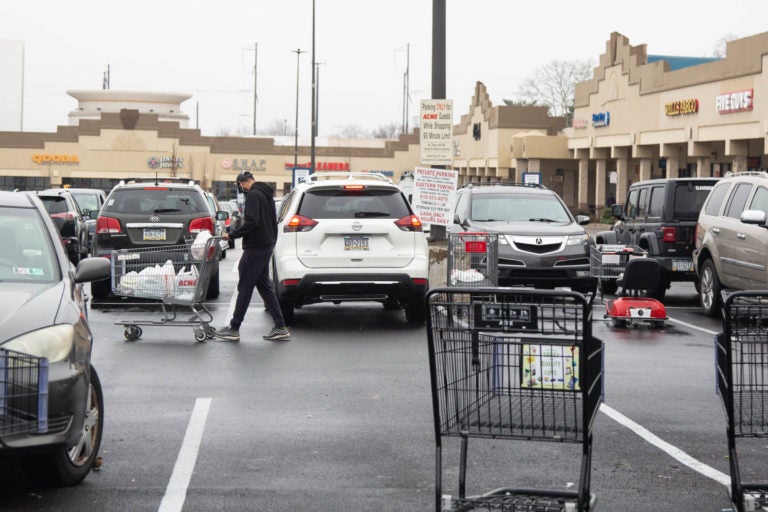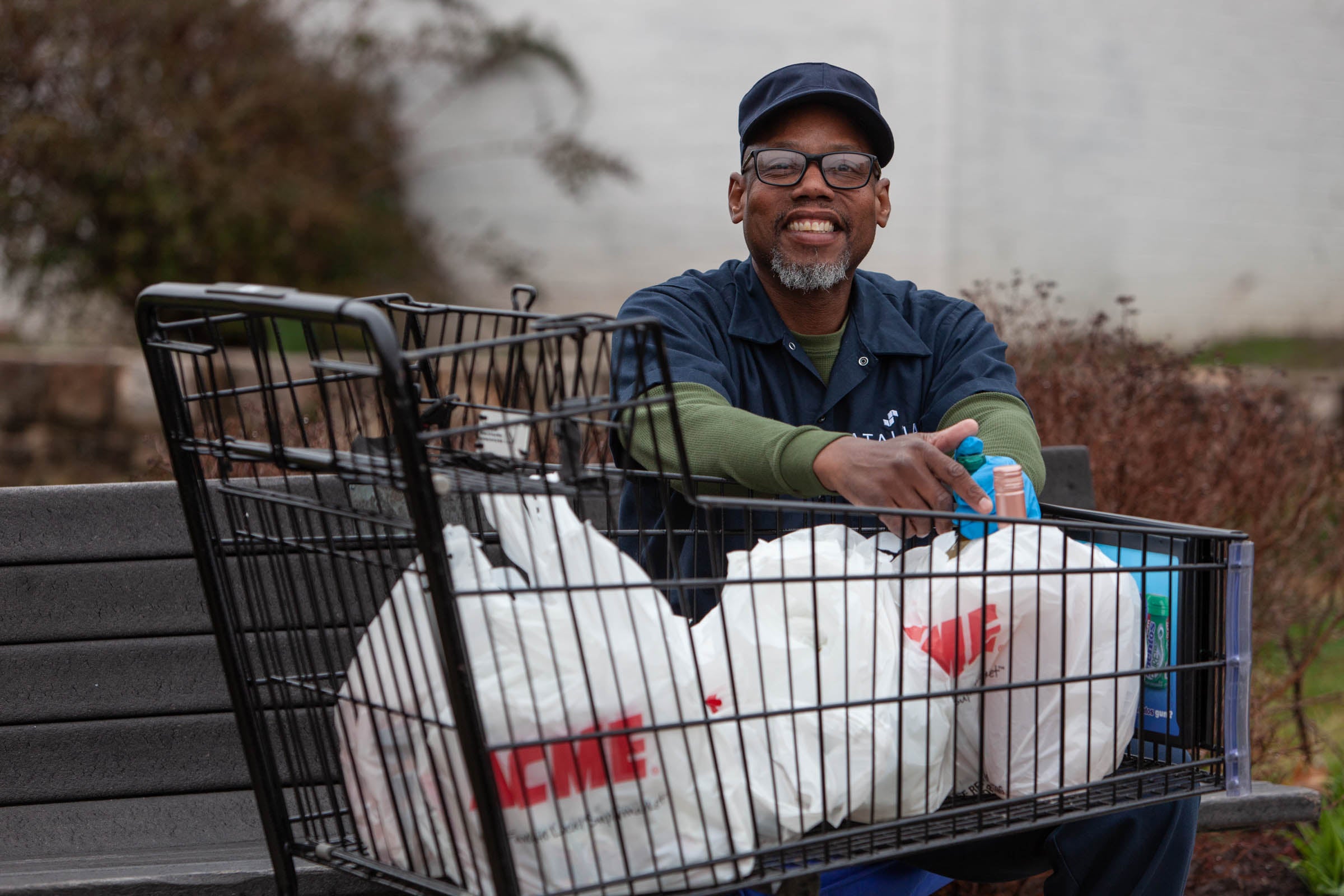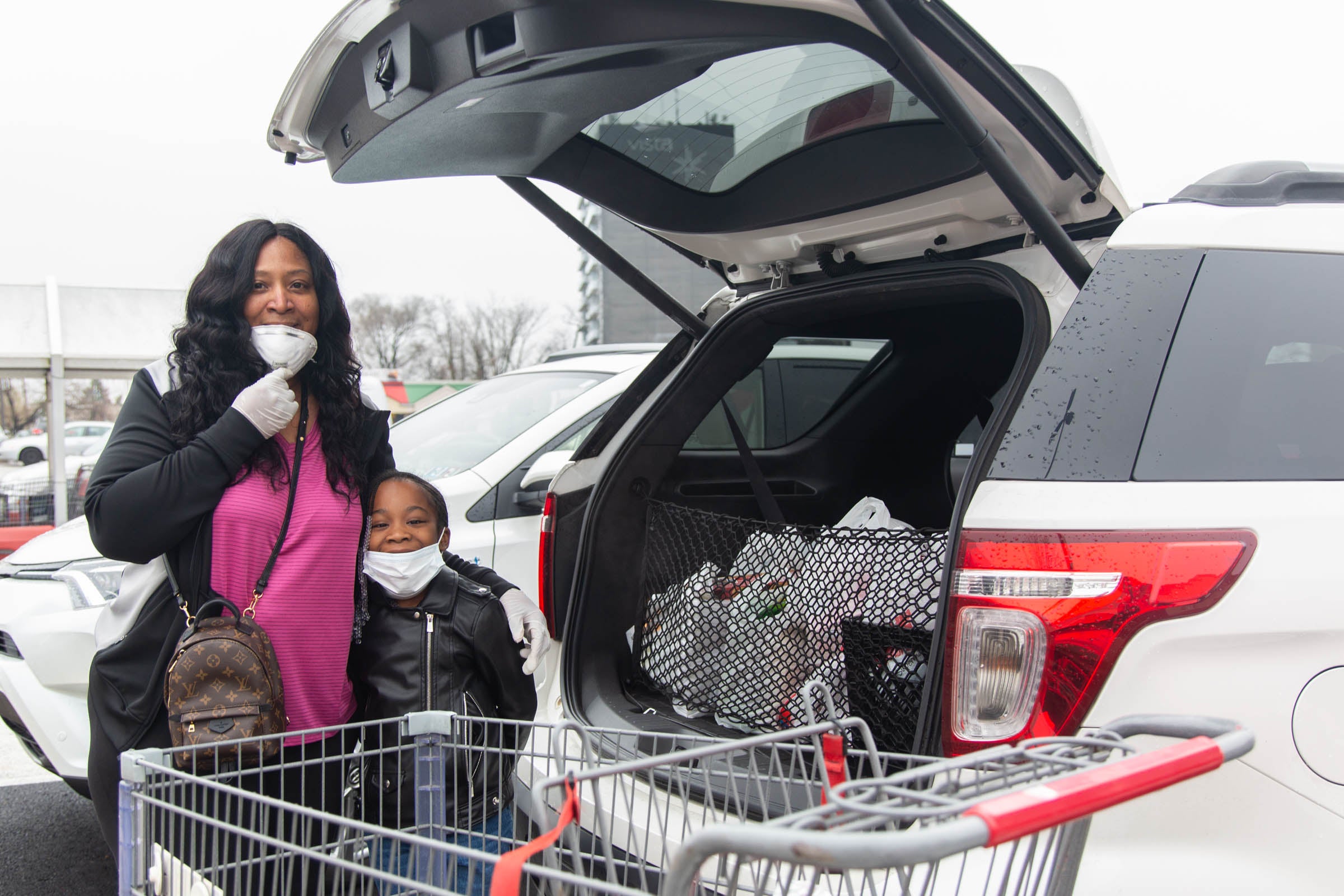Grocery store worries: Low supply, high demand, deep anxiety
Lines around stores, people buying $300 worth of food and other items at a time, cleaned-out shelves … welcome to pandemic shopping.

Carts litter the parking lot around 9 a.m. as a shopper heads back to their car with groceries after shopping at the ACME in Bala Cynwyd on March 19th 2020 during the uncertain times that surround the Covid 19 pandemic. (Emily Cohen for WHYY)
Shopping for groceries used to be a pretty routine chore. Since the World Health Organization declared the new coronavirus a pandemic, it’s become an often-frustrating adventure.
Some would say frightening.

“It feels like the apocalypse is upon us,” Chyna Jones said. “Everything looks really bare, and it’s a little scary, and I’m just wondering when they’re going to restock things, if they’re going to restock things.”
Jones managed to buy eggs, bread, meat, and vegetables at an Acme Market on Thursday morning, but there was no milk so she had to drive to a different store. Normally, she would go grocery shopping once every one or two weeks; she has been to the markets three times this week to hunt for produce.
Kevin James would typically buy groceries once a month. This week, he has been checking out the store every day just to see what he could get to stock up at home.
“It’s a matter of emergency now to my household,” James said. “As I kept watching current events, it was like this [is] serious, we can’t mess around with this.”

“It’s been insane,” said a meat cutter working in the Midwest for a large supermarket chain; she asked that her name not be used because her employer did not authorize an interview. “I’ve worked the last six days, and we haven’t been able to keep anything on the shelves. We’re cutting and grinding things, which are gone within minutes of putting it out. We run out of stuff at 10 a.m.”
“Some of the guys I work with who have been there for 30-plus years are like, ‘Never seen it this bad, not even Y2K was this bad, no snowstorms or anything.’”
In an interview, the meat cutter said she has seen people buy six to 10 gallons of milk at a time, carts full of toilet paper, carts full of fresh and frozen meat. She’s had difficulty buying any chicken or beef for herself, because a lot of it is gone by the time she finishes her shift at noon. She usually works an eight-hour day, and now works 10 hours a day.
She said many don’t understand how difficult it can be to work at a grocery store, especially during a pandemic.
“They think we have infinite supply in the back,” she said. “They don’t understand how difficult it is, for especially meat cutters, how much time it takes and how much effort it is to get that product cut and out on the floor. They usually think it can take a couple minutes, and it usually takes 20-30 on a normal day.”
In a text sent after the interview, the meat cutter said an automatic wrapping machine had broken, so a package of meat that would normally take 10 seconds to package now takes three minutes because they have to wrap it by hand. Some customers have been angry about that. She said there are three maintenance employees responsible for multiple stores.
“If you’re shopping, please don’t stand over the clerk’s shoulder while they’re stocking cause it makes them uncomfortable especially with the pandemic,” she said.
“People are starting to realize that people who work in grocery stores and on the supply chains, that their job is actually important, and people have been thanking us a lot more recently, which is really different and weird, we’re not used to being thanked … we still get the people who yell at us for not having stuff, but a lot more thanking.”
Lisa, who works for a California location of a grocery store chain, said some of the panic has been spreading among customers there. WHYY News is not using her full name because her employer did not authorize an interview.
“Everybody was panicking in the store. It was so clustered, so crowded, and that just added to … the chaos,” she said. “People who hadn’t already been panicking would come into the store … they would say, ‘Oh I just came in for yogurt … but then I saw this other person buying up all of these things with a full cart and I thought, oh I should do that too.’” And so they would end up with a full cart, $300 worth of groceries.”
“I had somebody tell me that somebody was taking groceries out of her cart, because … there was no milk on the shelf and so instead of going without milk, they took it from somebody else’s cart.”
“It’s not just a paycheck for a lot of us, we actually do take pride in what we do, so it’s hard for us to see when shelves are completely empty, and the store is gutted,” she said. “I wish they understood that there’s a lot of emotional labor that goes into it … it’s not just bagging groceries, it’s talking to people, and kind of absorbing their concerns and their worries, answering the same questions over and over again.”
“I wish people would think about their neighbors and other customers when they come to shop and how their actions affect them: when they’re buying out a whole shelf of things, how that’s going to affect the next person.”

Lisa said her California store has started limiting the number of customers who can come in at any given time, and limiting how much someone can buy of whatever items are in high demand. That has helped calm the atmosphere a lot, she said, though it does have the odd effect of making a grocery store seem like an exclusive club.
Many grocery chains, like Giant, Acme, Walmart, Target, Dollar General, and Whole Foods, have designated specific shopping hours for seniors and people with health conditions so they can avoid crowds.
Dana Ward, communications public affairs manager for Malvern-based Acme, said this current boom in demand for groceries is unprecedented, because even snowstorms and hurricanes affect specific parts of the country, while this is happening across the whole country at once.
“So everyone is competing for the same product sources, and that’s really what it comes down to: We are at the mercy of the vendors, and the vendors are at mercy of trying to get the products distributed.”
Vincent Finazzo, owner of Riverwards Produce Market, a small neighborhood grocery store in Philadelphia’s Fishtown neighborhood, said one large food distributor has canceled his order, and another has limited how much his store could buy. Along with a need to limit the number of customers to five at a time for social distancing, he said, it has been difficult for his business. So he laid off 21 people from his 33-member staff.
Alex, one of the employees laid off at Riverwards, said he does not understand why Finazzo would cut staff after a weekend of record sales. (He asked that we not use his last name, for privacy reasons.)
He said the layoffs happened after employees organized and signed a petition asking for $5 of hazard pay per hour due to health concerns over the coronavirus, and signs encouraging credit card or touchless payment systems.
Finazzo said that the petition had nothing to do with the layoffs, and that not all the employees who signed the petition have been laid off. The laid-off employees started a crowdfunding campaign.

There has been such a big demand for groceries that many chains, like Acme, Safeway, and Kroger, have recently posted that they are hiring employees immediately.
Finazzo said he is going to do more online orders or arrange curbside pickup, so customers can still get the food they need while doing social distancing.
“The multitude of scenarios that I’m trying to process right now is very overwhelming,” he said. “We are living in unprecedented times during a global pandemic … no one really knows what the next steps are, and you hear that it could be fine in two weeks, or it could be 18 weeks.”
WHYY is your source for fact-based, in-depth journalism and information. As a nonprofit organization, we rely on financial support from readers like you. Please give today.






![CoronavirusPandemic_1024x512[1]](https://whyy.org/wp-content/uploads/2020/03/CoronavirusPandemic_1024x5121-300x150.jpg)


